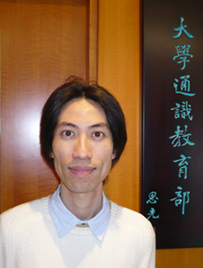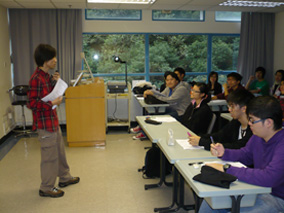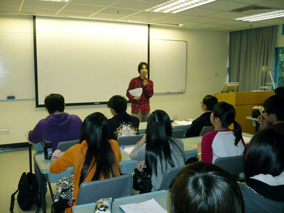Exemplary Teaching Award in General Education 2009
Time: 3:30-5:00pm
Venue: G3 Fung King Hey Building, CUHK
Ever since the founding of The Chinese University of Hong Kong (CUHK), General Education has been a key part of the undergraduate curriculum which aims at nurturing students as educated persons with the intellect and inclination to appreciate broad issues of concern to humanity and modern society.
Over 200 teachers offer General Education courses at CUHK, many of whom are dedicated and outstanding. In recognition of their contributions, the Senate Committee on General Education (SCGE) resolved in 2006 to launch the Exemplary Teaching Award in General Education. Nominations are invited from all the GE teachers and undergraduate students. The nominations are reviewed by the SCGE Standing Committee basing on the course design, teaching and learning activities, and tutelage in the General Education courses they offered.
This year, nine teachers were nominated for the Award and the Exemplary Teaching Awards in General Education go to Dr. Wong Kim Fan, Adjunct Assistant Professor of Department of Philosophy and Part-time Lecturer of Department of Translation.
Our heartiest congratulations!
Dr. Wong Kim Fan

Part-time Lecturer of Department of Translation
dust-filled nest and stride into a world of open sky
and boundless sea."
“Anyway, I keep picturing all these little kids playing some game in this big field of rye and all. Thousands of little kids, and nobody’s around — nobody big, I mean — except me. And I’m standing on the edge of some crazy cliff. What I have to do, I have to catch everybody if they start to go over the cliff — I mean if they’re running and they don’t look where they’re going I have to come out from somewhere and catch them. That’s all I’d do all day. I’d just be the catcher in the rye and all. I know it’s crazy, but that’s the only thing I’d really like to be.” (J.D. Salinger)
Dr. Wong Kim Fan graduated from the Department of English, Hong Kong Baptist University with a BA in Translation. He went on to study the translation of philosophical texts and obtained a PhD degree from the same university. His areas of research interests include translation, travel and philosophy.
Dr. Wong’s connection with The Chinese University of Hong Kong can be traced back to his days as a student, when he took up teaching and research work at the University. Over the years, he has taught three courses for University General Education at CU, namely, ‘Human Happiness’ , ‘Travel and Translation’ and ‘Classics for Today: In Search of Good Life and Good Society’ . The course ‘Human Happiness’ aims not to provide students with a manual for achieving happiness, but to help them contemplate “happiness”. Adopting an inter-disciplinary and cross-cultural approach, the course invites students to reflect on the problem of “happiness” in the modern world. For instance, people nowadays generally think that happiness is a right, but where does this idea come from? What are the criteria of happiness? Who should set them? Can human beings be masters of their happiness? For Dr. Wong, it is the wish of everyone to lead a happy, fulfilling life. But happiness does not just fall from the sky; only by taking a right approach in life may we hope to come close to it. How are we to fare the journey of life? This is not a question to be addressed by the philosopher alone; anyone aspiring for a wonderful life must deliberate it. Completing a course on happiness does not necessarily mean a thorough understanding of “happiness”, but it should at least provide students with some pointers so they can continue their search for an answer of their own.
‘Travel and Translation’ explores the multifaceted relationship between travel and translation from interdisciplinary perspectives. According to Dr. Wong, the traveler often manipulates the non-traveler’s understanding of the outside world, because the traveler’s prejudice and perception may lead to distortions of the “facts”, and therefore a misinformed understanding of the world by the non-traveler. Worse still, the translation of travel writing may result in “double lies”—the original text itself may not reflect the truth, and the inaccuracy of translation further distorts the truth. So, the core question of ‘Travel and Translation’ is: If intercultural exchange is based on travel and translation, how “true” is the world we come to know through “language”? The course challenges students to rethink views they have taken for granted, so they may see that underlying the reality there are intricate relationships and power politics at work. In this way, students will understand how human mobility and intercultural exchange have constructed the world today. Dr. Wong is good at using real-life examples and plain language to elucidate difficult concepts. His use of the history of Chinese translation regarding the word “England” is a case in point. The name of the country has changed from early transliterations carrying negative connotations, to later renditions made up of positive Chinese characters; such a history of translation reflects the change of China’s foreign relations and the power relations underlying translation. Dr. Wong makes good use of his own travel experience when designing course assignments, and has engaged students with lively and interesting assignment topics.
‘Classics for Today: In Search of Good Life and Good Society’ aims at engaging students in direct dialogues with classics of the East and West, addressing questions related to their life and society, including: What is the meaning of friendship, love, journey, and glory? What inspirations can we draw from Christianity, Islam and Buddhism in our quest for a “good” life and “ideal” society? What makes a “good” society for everyone—a selfless ruler? a political system that safeguards individual freedom? or an economic system built upon the maximization of self-interest? For Dr. Wong, classics play an important role in the history of civilization. They are books that have stood the test of times, and every time they are re-read they lead to new insights. Directly or indirectly, classics help human beings to correct their mistakes, rid themselves of doubts, and reduce their suffering. Classics are often rich in contents and profound in meaning, harboring a keen hope that the world will be a better and happier place. Dr. Wong’s “affair” with classics already began when he was in junior secondary school. He remembers most vividly his first encounter with Catcher in the Rye, the inexplicable sadness that lingered, and the mysterious delight of the language and of the feeling that someone had spoken his mind. He went on to read up all other works by Salinger that he could lay his hand on. Back then, he had no idea what “some crazy cliff” meant. Re-visiting the paragraph again many years later, he realized it was a good expression of the ideal of education. When approaching a classic in class, Dr. Wong always provides important background knowledge before raising questions on core issues for students’ discussions. He believes students are capable of digging deep and being creative. In the last term, one of his students drew remarkable parallels between the serpent that tempted Adam and Eve to eat of the Forbidden Fruit and the man who returned to the cave after getting a glimpse of the reality outside in Plato’s Republic. Another student wrote a script for a play reinventing the story of Noah’s Ark and submitted it as the term paper. Both examples bear proof to students’ ability to connect and integrate what they have learnt, and the room Dr. Wong allows for his students to flourish and thrive.
Dr. Wong thinks that General Education is absolutely not common-sense chitchat. General Education courses promote connection and integration of different fields of knowledge, requiring students to “go out of the box” and break free from their regular mode of thinking. In doing General Education, students expand their knowledge base and reflect on problems with multiple perspectives, seeking to know themselves and then the world, and learning to sympathize, understand, and accommodate. The same applies to university education. In addition to acquiring different kinds of knowledge, students must learn to integrate what they have learnt, and ingeniously apply the learning to work and life. The ultimate goal is that each will develop their strengths and potentials to the full, and add a stroke of beauty to the human world.



